The lecture about Krakow begins with Kadłubek after the war with the Romans, where it is mentioned that the Prapolates chose Krak to be a prince. Next, Kadłubek briefly describes the history of another great tribe, which was the only one that could compete with the Poles - the Gauls. They were supposed to enter Pannonia at some time. The obvious fact of the fights between the Prapolaks and the Galls flows from Master Wincenty (Panonia was considered in the Middle Ages as the cradle of the Slavs). This state of affairs was supposed to trigger among the former centrifugal tendencies - the drive to power various units. That is why Krak, who for some unknown reasons was not there at the time (Kadłubek writes that he came back from Carinthia, it is possible that he was there on a military expedition), he returned and decided to gather everyone at the rally. At this meeting, he won the trust of the public (Kadłubek puts in his mouth the words: "the same world without the sun - what a state without a king"), which proclaimed him king.
Wincenty Kadłubek made the name Krak Latin in the form of "Gracchus" and under this name, the character appears in his chronicle. Undoubtedly, this has its roots in the desire to compare Krak to another famous legislator and guardian of the citizens of Tiberius Gracchus. Not without significance is the fact that the initial information about Krakow appears in the chronicle of Kadłubek when he describes the struggles of the Poles with the Romans. Namely, when the fighting ceased, the Prapolates were to occupy certain cities, in which they then established the governors. At the same time, they also chose the prince who was just Krak. What, however, results from the further course of the story, did not equal the superior position of the tribe - he was probably one of the governors. Hence, Krak became the governor most likely in some Roman cities.
Another thing pointing to the connection between Rome and Tiberius Grakchem is in the description of Krak's first deeds when he was proclaimed king. The law that the new king created, Kadłubek dressed in clothes taken from the Romans ("Thus arose the relationship of our civil rights and its birth"). The principles of the new law were based on the abolition of slavery and injustice (what Tiberius Grakch fought for). In this way, the chronicler wanted to give Krakow stronger historical grounds.
When the legislative activity was completed, Kadłubek uses the term "Poland" for the first time, which Krak was supposed to bring to "great prosperity". The flourishing, however, did not last long, as the newly created state encountered a new problem on its way in the form of a monster called the "all-nourished". As the master Wincenty wrote, he was to terrorize the subjects of Krakow with the demand for a cattle victim whose deliveries were required every week. If the sacrifice had not been made, he would eat as many people as the cattle would be delivered to him. In this situation, Krak sent on the monster of his sons who, after failures in an open fight, resorted to deception. They gave "all-eaters" as the usual sacrifice of cow's skin stuffed with sulfur, which they strangled the monster with. This story is related to the fratricidal thread, which eventually led to a temporary interregnum in the state of Krak. Namely, when his sons killed the monster, the younger of lust for power was about to throw on the elder and kill him, and he lied to his father that it was the monster's fault.
After Krak's death, his son briefly took over. However, the dark secret of Krak II was soon discovered and condemned to banishment. In spite of everything, the love of the people to Krak and his family was to be so great that power was soon granted to his daughter Wanda. On the occasion of Kadłubek, he notes that the decision-making center in this matter was the meeting of the "Senate, the Mighty and the whole people."
In recognition of Kraka senior after his death, the construction of the city on the rock in which the "All-Eater" lived. According to Kadłubek, the city was called Gracchovia (Krakow) and the funeral rituals of the deceased king were filled until the last building was finished. Master Wincenty also notices that the name of the city of Krakow is derived from the ravens of ravens, which were ordered to feed on the body of the "all-eaters".
1. A LEGEND ABOUT THE Wawel Dragon AND THE SPOTLIGHT OF WOMEN
Everyone knows the legend of the Wawel dragon, defeated by the brave Szewczyk Skuba. He killed the ram, stuffed it with sulfur and pitch, and then threw it under the dragon's pit. The Dragon quenched its thirst drank the Vistula water for so long until it broke. According to the legend, they can still be bought in the Sukiennice today.
2. LEGEND OF CHAKRA
Everyone knows that Krakow is a magical city. The controversial legend today (from which the director of the Wawel cut off, among others) states that it has to do with the chakra, that is, the sacred mysterious stone hidden on the Wawel Hill and the source of extraordinary energy. Some people think that this is nonsense, but others - like Anna Szłapak - believe in the power of stone. Radiesthetic measurements have shown that the "heart" of the chakra lies in the basement of the west wing of the castle, in the chapel of St. Gereon. Negative ionization has been detected here, which affects general relaxation.
The Krakow legend is related to the Hindu god Shiva, who dropped seven magic stones in seven parts of the world. One of them went to Wawel. Hindus have been coming here for a long time to pray - today we know why.
3. LEGEND OF KRZYSZTOFORSKIE SHARES
At the street of Ul Szczepańska and the Main Market Square is the Krzysztofory Palace. underneath there is a real maze of basements and corridors. Some of them are spreading all over the Market Square and leading to the St. Mary's Church. Supposedly, the wizard Christopher kept gold in the dungeons guarded by the devil.
The only person who saw the devil was a cook. When she wanted to kill the rooster for dinner, he fled to the dungeons. When, after a long search, the woman found a rooster in the underground, it turned out to be a devil. He promised her that if he would give him life, he would give her gold. The condition was one - when returning to the palace, he was unable to turn his back. However, the female curiosity won, and then the gold turned into garbage. Some say that the treasure remains in the dungeons to this day, others believe that it is guarded by a basilisk: a creature with a rooster's body, a lizard's tail, and frog's eyes, which everybody's eyes turn into stone.
4. LEGEND ON TOWERS OF THE ST MARY CHURCH
The pride of Krakow is the St. Mary's church with two towers. The architectural peculiarity of the church is the fact that they are unequal. From the higher one, called Hejnalica, a bugle call is played. In the lower one, there is a church bell called Półzygmunt. There are no plans that would explain the height of the different towers. It is known for the legend written by Józef Mączyński about two brothers, the famous bricklayers who started construction at the end of the 13th century. When the older brother realized that his tower was much higher, not wanting to be overtaken - he murdered his brother. However, the guilty conscience gave him no peace, so he stabbed the knife into his heart, and then he threw himself from the top of the tower. That bloody blood-soaked knife hangs today, chained in the Cloth Hall.
5. A LEGEND ABOUT WANDA, WHAT WERE NOT WANTING GERMAN HUSBAND
In Mile, there is the Wanda mound. It is not known when it was built, but the legend links his uprising with Princess Wanda, who did not want to marry the German Prince Rydygier, not to give the country under foreign rule. The prince threatened to invade Wanda's lands, but the fiery speech given by the princess caused the enemy to depart from the armed plan. The humiliated prince took his own life. Wanda, however, was sad because she knew that she had to sacrifice her thanks to the gods. So she went to the Vistula River and threw herself into the water. Wanting to celebrate the heroism of the princess, the nation made a mound of it.

































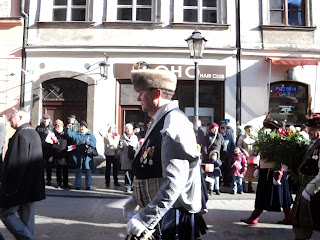









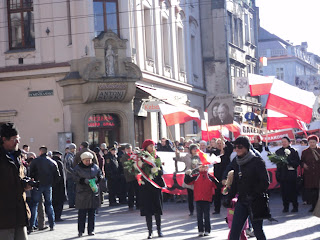






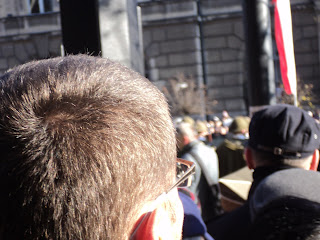













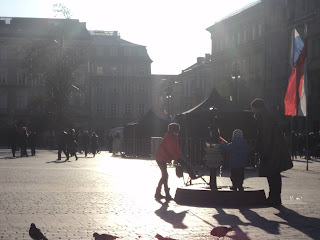
































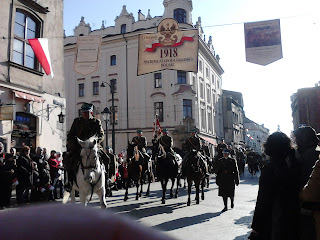


No comments:
Post a Comment